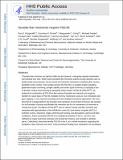Durable fear memories require PSD-95
Author(s)
Fitzgerald, P J; Pinard, C R; Camp, M C; Feyder, M; Sah, A; Bergstrom, H C; Graybeal, C; Schlüter, O M; Grant, S G; Singewald, N; Holmes, A; Liu, Yan; Xu, Weifeng; ... Show more Show less
DownloadXu_Durable fear.pdf (755.8Kb)
PUBLISHER_POLICY
Publisher Policy
Article is made available in accordance with the publisher's policy and may be subject to US copyright law. Please refer to the publisher's site for terms of use.
Terms of use
Metadata
Show full item recordAbstract
Traumatic fear memories are highly durable but also dynamic, undergoing repeated reactivation and rehearsal over time. Although overly persistent fear memories underlie anxiety disorders, such as posttraumatic stress disorder, the key neural and molecular mechanisms underlying fear memory durability remain unclear. Postsynaptic density 95 (PSD-95) is a synaptic protein regulating glutamate receptor anchoring, synaptic stability and certain types of memory. Using a loss-of-function mutant mouse lacking the guanylate kinase domain of PSD-95 (PSD-95GK), we analyzed the contribution of PSD-95 to fear memory formation and retrieval, and sought to identify the neural basis of PSD-95-mediated memory maintenance using ex vivo immediate-early gene mapping, in vivo neuronal recordings and viral-mediated knockdown (KD) approaches. We show that PSD-95 is dispensable for the formation and expression of recent fear memories, but essential for the formation of precise and flexible fear memories and for the maintenance of memories at remote time points. The failure of PSD-95GK mice to retrieve remote cued fear memory was associated with hypoactivation of the infralimbic (IL) cortex (but not the anterior cingulate cortex (ACC) or prelimbic cortex), reduced IL single-unit firing and bursting, and attenuated IL gamma and theta oscillations. Adeno-associated virus-mediated PSD-95 KD in the IL, but not the ACC, was sufficient to impair recent fear extinction and remote fear memory, and remodel IL dendritic spines. Collectively, these data identify PSD-95 in the IL as a critical mechanism supporting the durability of fear memories over time. These preclinical findings have implications for developing novel approaches to treating trauma-based anxiety disorders that target the weakening of overly persistent fear memories.
Date issued
2014-12Department
Massachusetts Institute of Technology. Department of Brain and Cognitive Sciences; Picower Institute for Learning and MemoryJournal
Molecular Psychiatry
Publisher
Nature Publishing Group
Citation
Fitzgerald, P J et al. “Durable Fear Memories Require PSD-95.” Mol Psychiatry 20, 7 (December 2014): 901–912 © 2015 Macmillan Publishers Limited
Version: Author's final manuscript
ISSN
1359-4184
1476-5578